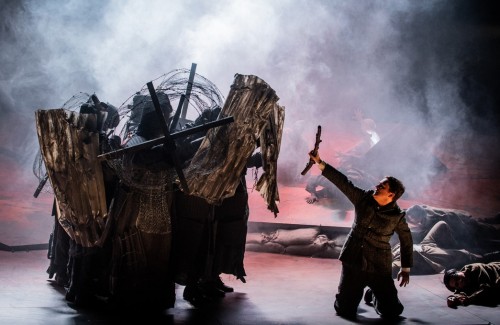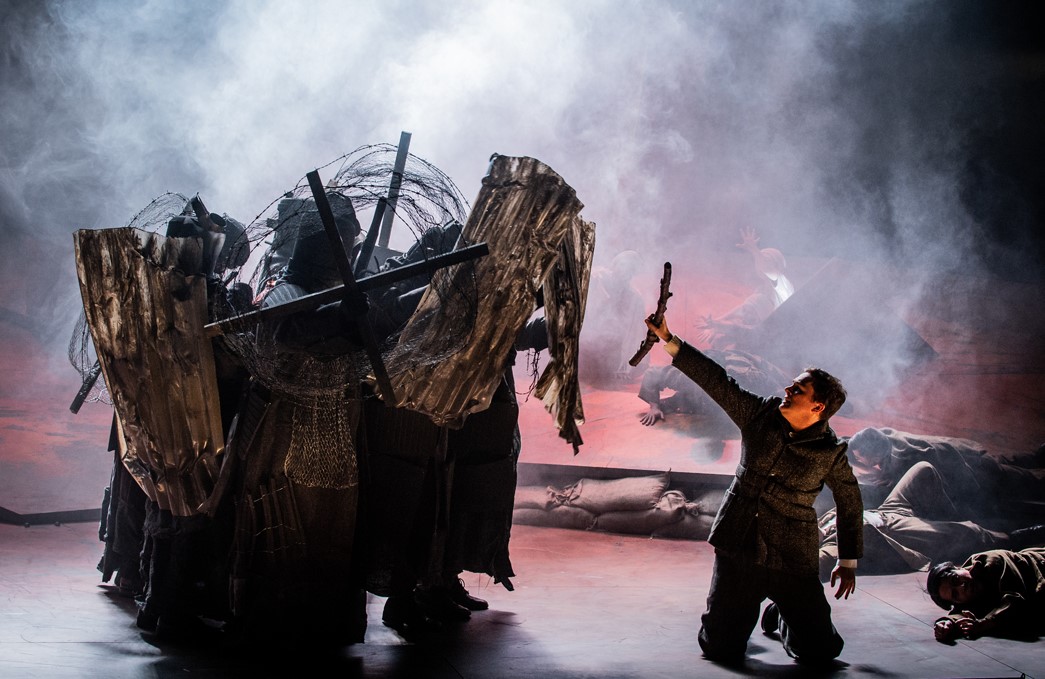 United Kingdom Ralph Vaughan Williams, The Pilgrim’s Progress: Soloists, Chorus and Opera Orchestra of the Royal Northern College of Music / Rebecca Tong (conductor). RNCM Opera Theatre, Manchester 5.4.2019. (MC)
United Kingdom Ralph Vaughan Williams, The Pilgrim’s Progress: Soloists, Chorus and Opera Orchestra of the Royal Northern College of Music / Rebecca Tong (conductor). RNCM Opera Theatre, Manchester 5.4.2019. (MC)

Production:
Director – Jonathan Cocker
Set and Costume designer – Bob Bailey
Lighting designer – Ian Sommerville
Cast included:
John Bunyan – Patrick Ralph
Pilgrim – Lachlann Lawton
Evangelist – Peter Lidbetter
Pliable – Harri Graham
Obstinate – Emyr Jones
Mistrust – Joseph Ashmore
Timorous – Andrew Terrafranca
Interpreter – Kamil Bien
Watchful – John Ieuan Jones
Herald – Jordan Harding-Pointon
Voice of Apollyon – George Butler
Branch Bearer – Olivia Carrell
Cup Bearer – Ingvild Schultze-Florey
Woodcutter’s Boy sung by Flora Birkbeck
Mister By-Ends – Ryan Davies
Madam By-Ends – Stephanie Maitland
Voice of Bird – Rachel Speirs
Vanity Fair, Act III – Andrew Masterson, Clare Hood, Naomi Rogers, Andrew Terrafranca, Steffan Owen, Samuel Snowden, James Mitchell, Emyr Jones, Samuel Knock, Matthew Baldwin, James Holt, Matthew Curtis, Erin Rossington, Victoria Armillotta
Only seldom do I encounter stagings of Vaughan Williams’s The Pilgrim’s Progress and the reference book The Penguin Concise Guide to Opera doesn’t include this underrated masterpiece at all. So, as an admirer of Vaughan Williams’s music, having the rare opportunity of reporting on a production of The Pilgrim’s Progress felt like a real privilege. Directed by Jonathan Cocker this new production given by students at the Royal Northern College of Music is typical of the often uncommon, yet always fascinating repertoire chosen for its productions. As usual RNCM opera productions are double cast and this review concerns the alternative roster.
A Christian classic written by John Bunyan, for two centuries The Pilgrim’s Progress was one of the most popular books ever written. Designated as an ‘Allegory’ by Bunyan his text, which clearly inspired Vaughan Williams, is a symbolic vision of man’s eventful pilgrimage through life on his spiritual journey from the City of Destruction to the Celestial City. The Pilgrim’s journey in effect represents the trials and tribulations that we all make through life in some way. Vaughan Williams’s association with Bunyan’s The Pilgrim’s Progress began as a young child in the 1870s and by 1906 he was writing his first music based on the book. Describing it as a ‘Morality’ rather than an opera, for his libretto to The Pilgrim’s Progress Vaughan Williams’s freely adapted Bunyan’s book, used interpolations from the Bible, and included verse by Ursula Wood. Some forty-five years after his first writing on the subject the opera première was given at Covent Garden, London in 1951.
Stage director Jonathan Cocker and his creative team employ a theme of the Western front during First World War with the Pilgrim a deserter who has left his company on his quest for ultimate salvation. By focusing on this First World War landscape Bailey is powerfully acknowledging Vaughan Williams’s time spent in the Royal Army Medical Corps as an ambulance driver, a harrowing experience that must have left a lasting emotional scar. Evidently the composer carried Bunyan’s book with him during his time in the medical corps. Cocker has created a first class staging that is both a visual and aural delight. Not having previously seen the opera I have nothing to compare it to and despite the absence of a directorial note Cocker’s cogent staging was relatively easy to understand, bringing the action to life at a pace which seemed to zip along. I found it astonishing how much of this production dovetailed seamlessly with Vaughan Williams’s adaptation of Bunyan’s text. Nevertheless there were some episodes that jarred, notably when the Pilgrim as a deserting soldier on the Western Front with no visible injuries and likely suffering from shell-shock was befriended by a medical officer who asked politely if he should prepare him a room, most unlikely owing to the attitude by the military at that time to posttraumatic stress disorder.
Set and costume designer Bob Bailey based his magnificent set on an austere First World War landscape on the Western Front that could easily have been inspired by paintings of war artist Paul Nash, reminding me especially of his works The Menin Road and We are Making a New World. The haunting scene which was maintained through the whole opera was one of a ravaged battlefield of shell holes and destroyed trenches with blasted trees and a road that cut through the centre of a forbidding battleground. Ochre coloured tinged with brown, yellow and orange the bleak landscape was lit from behind by rays of light from an apocalyptic sky. Bailey’s high-end costumes were eminently in keeping with the Great War period and looked ideal. Impressive too were designer Ian Sommerville’s overall lighting effects especially the gun flashes and shell explosions.
The title role of the Pilgrim involves being on the stage virtually from beginning to end. Rising to the challenge Lachlann Lawton showed real promise and personality in this demanding role, displaying his firm baritone with an attractive and expressive tone. Other performances that seized my attention were from bass-baritone Peter Lidbetter as the Evangelist, steady and quite beautifully in tune and Kamil Bien highly accomplished with an attractively smooth lyric tenor as the Interpreter. In convincing voice and one of the highlights of the evening was baritone John Ieuan Jones, vocally firm and intense in the role of Watchful. As the herald in his red robes, chain of office and wig Jordan Harding-Pointon relished the humorous role. In an opera with little opportunity for woman singers to shine the voices of soprano Olivia Carrell as the Branch Bearer and mezzo-soprano Ingvild Schultze-Florey as the Cup Bearer caught my attention. Woodcutter’s Boy sung by Flora Birkbeck and Stephanie Maitland as Madam By-Ends also made as much as they could of their roles.
Unfolding the score well Rebecca Tong did a sterling job conducting the RNCM Opera Orchestra who played with impressive consistency and verve, conveying appropriate sensitivity when required. Worthy of special praise were the solo contributions notably the clarinet, bassoon, trumpet and horn. As I have come to expect Kevin Thraves had coached the chorus to a high standard who sounded splendid all evening. For the concluding section, designed to create spatial effects whilst in darkness, soprano Rachel Speirs as the Voice of Bird was positioned in the side lighting gallery (virtually drowned out by the strident orchestra) and a trumpeter and small choral group as the Celestial Voices appeared at the rear of the auditorium.
Compelling and entertaining this top drawer staging by Jonathan Cocker and Bob Bailey is certainly worthy of being taken up by a major opera house.
Michael Cookson
